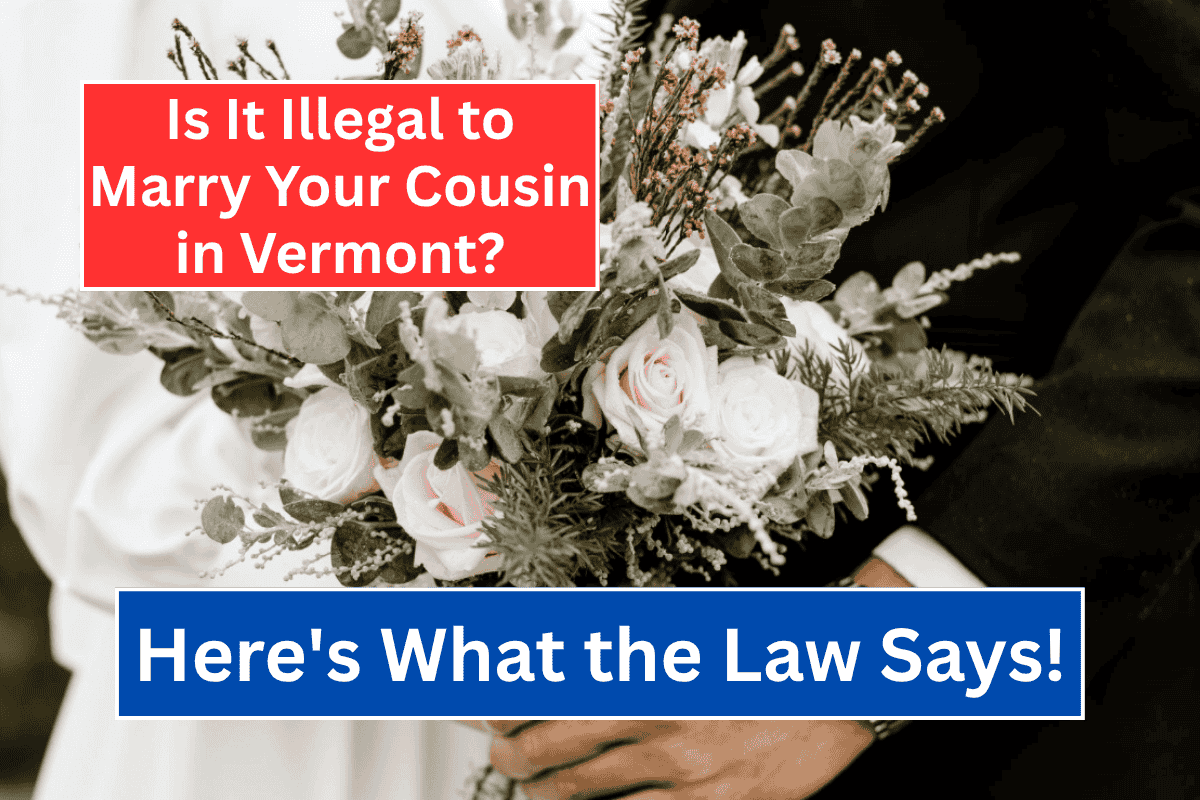In Vermont, first cousins can legally marry. The state does not have specific laws prohibiting marriage between first cousins, and there are no additional restrictions on this type of union.
However, like in other states, there are laws that govern what relationships are not allowed to marry, such as siblings, parents, and half-siblings.
In this article, we will explore the details of first cousin marriages in Vermont, explain the types of cousins that can marry, and what you need to know about applying for a marriage license.
Types of Cousins That Can Get Married in Vermont
Vermont permits the marriage of all types of cousins, including:
First cousins (those who share common grandparents)
Half-first cousins (first cousins through a half-sibling of your parent)
First cousins once removed (children of your first cousins)
Second, third, and further cousins (and more distant relationships)
It’s important to note that half-siblings are not allowed to marry in Vermont. If you’re unsure whether your relationship qualifies as a cousin or a half-sibling, it’s crucial to clarify that before proceeding with the marriage process.
What You Should Know About First Cousin Marriages in Vermont
To marry in Vermont, first cousins need to apply for a marriage license from the town or city clerk’s office. Here are some key things to know:
Marriage License Application: You can apply for a marriage license at any clerk’s office in Vermont. The license is valid across the state, meaning you don’t need to marry in the same county where you apply for the license.
Non-Residents Can Marry: Neither of the couple members needs to be a Vermont resident to apply for a marriage license. If one of you is a resident, you can apply in that county; if neither is a resident, you can apply in any county.
Application Form: The Vermont marriage license application does not specifically ask if you are related, such as whether you are cousins. However, the clerk might ask you during the process if you are related. If asked, you can simply explain that you are first cousins or further out.
Marriage Laws: Vermont’s marriage laws are straightforward and don’t mention first cousins in the list of prohibited relationships. This means that the state does not place any restrictions on marriage between first cousins.
Relationships That Cannot Marry in Vermont
While first cousins are allowed to marry in Vermont, certain relationships are specifically prohibited. According to Vermont law:
You cannot marry your parent, grandparent, child, grandchild, sibling, sibling’s child, or parent’s sibling.
This list of prohibited relationships is clear, and first cousins are not included. As such, first cousin marriages are permitted, even though some other states in the U.S. have laws against them.
Do Cousins Travel to Vermont to Get Married?
Vermont shares borders with Massachusetts, New Hampshire, and New York. Of these, New Hampshire is the only state where first cousin marriages are prohibited. In some cases, couples from neighboring states where cousin marriages are illegal may choose to travel to Vermont to marry legally.
However, it’s worth noting that not all states recognize marriages performed in states where cousin marriages are legal. If you’re planning to marry in Vermont and live in a state that bans cousin marriages, make sure to check if your state will recognize your marriage.
Roman Catholic Marriages in Vermont
If you plan to marry in a Roman Catholic church in Vermont, there is an additional consideration. Historically, the Catholic Church has been hesitant to allow first cousin marriages. However, recent changes to church law have relaxed this stance. First cousins who wish to marry in a Catholic church will need to obtain a dispensation from the church hierarchy.
This process involves asking for special permission from the church to marry in a religious ceremony. For second cousins and more distant cousins, special permission is not required, but it’s recommended to inform the priest beforehand to avoid confusion.
What About Second Cousins?
Second cousins (and more distant cousins) do not need special permission to marry in Vermont or from the Catholic Church. These relationships are not considered close enough to require a dispensation, making the process simpler for those marrying second cousins or beyond.
However, it’s always a good idea to mention the relationship to the priest, especially to avoid confusion when discussing your family connections.
In Vermont, first cousins can marry legally, and there are no special restrictions on this union. The application process for a marriage license is straightforward, and couples do not need to be Vermont residents.
While the marriage of first cousins is allowed, some other states do not recognize these marriages, so be sure to check your state’s laws if you plan to live elsewhere after marrying.
In the case of marrying in a Roman Catholic church, first cousins will need to go through the dispensation process, but second cousins and beyond are free to marry without additional permissions.
If you have questions or concerns about your specific situation or relationship, it might be helpful to consult a legal expert or the local marriage clerk in Vermont for more information.












